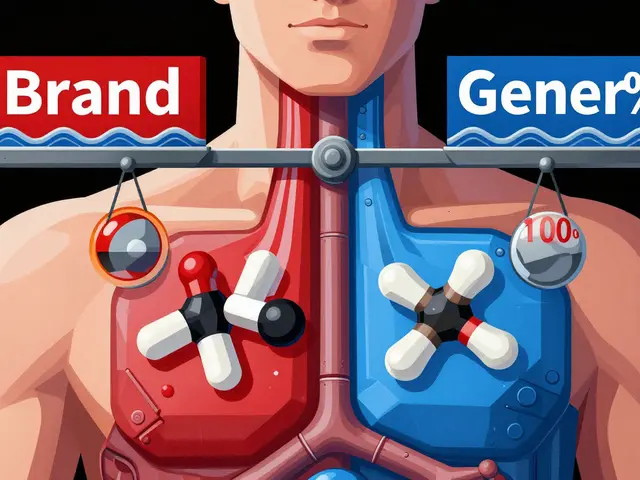Hyperthyroidism, a condition where the thyroid gland produces too much hormone, can lead to a wide range of symptoms, one of which is muscle weakness. While it may be an overlooked symptom, understanding this connection is important for those affected by this condition.
Muscle weakness in hyperthyroidism occurs because the excess thyroid hormones speed up the body's metabolism, which can lead to the breakdown of muscles and loss of muscle mass. This can affect daily activities and overall quality of life.
In this article, we will delve into what hyperthyroidism is, how it impacts muscle health, the signs of muscle weakness to watch out for, and practical tips to manage and improve muscle strength. By understanding these aspects, those affected by hyperthyroidism can take steps towards better health and well-being.
- What is Hyperthyroidism?
- How Hyperthyroidism Affects Muscles
- Recognizing Muscle Weakness Symptoms
- Managing Muscle Weakness
- Tips to Improve Muscle Strength
What is Hyperthyroidism?
Hyperthyroidism is a condition where the thyroid gland, located at the front of the neck, produces excessive amounts of thyroid hormones. These hormones are responsible for regulating the body’s metabolism, heart rate, digestive functions, muscle control, brain development, and bone maintenance. When their levels become excessively high, it can lead to a variety of health issues.
The thyroid gland is a butterfly-shaped organ that plays a crucial role in how the body uses energy. In hyperthyroidism, the overproduction of thyroid hormones speeds up the body's metabolic rate, causing symptoms such as rapid or irregular heartbeat, unexpected weight loss, sweating, and irritability. The most common cause of hyperthyroidism is Graves’ disease, an autoimmune disorder where the immune system mistakenly attacks the thyroid gland, causing it to produce too much hormone.
Other causes of hyperthyroidism can include thyroid nodules, which are lumps in the thyroid gland that increase hormone production, and thyroiditis, an inflammation of the thyroid which can cause sudden hormone release. Taking too much thyroid hormone medication or excessive intake of iodine can also result in hyperthyroidism.
Diagnosing hyperthyroidism involves blood tests that measure the levels of thyroid hormones (T3 and T4) and thyroid-stimulating hormone (TSH), which is produced by the pituitary gland to regulate thyroid function. Typically, a low level of TSH and elevated T3 and T4 indicate hyperthyroidism.
Treating hyperthyroidism aims to reduce the production of thyroid hormones and restore normal hormone levels. Common treatments include antithyroid medications, radioactive iodine therapy, which gradually shrinks the thyroid gland, and in some cases, surgery to remove part or all of the thyroid gland. Each treatment has its advantages and potential side effects, and the choice of treatment depends on the underlying cause, severity of symptoms, and individual health considerations.
Living with hyperthyroidism can be challenging, but with appropriate medical intervention and lifestyle adjustments, individuals can manage the condition effectively. Regular check-ups, adhering to prescribed treatments, and paying attention to diet and stress management are essential steps.
“Hyperthyroidism affects every aspect of your life. Getting a proper diagnosis is key to managing the condition.” - Dr. Marie Jones, Endocrinologist
Knowing more about hyperthyroidism helps in recognizing its symptoms early and seeking timely treatment, thus avoiding complications and improving quality of life. In the next sections, we’ll explore how hyperthyroidism specifically impacts muscle health and what can be done to manage it effectively.
How Hyperthyroidism Affects Muscles
When the thyroid gland overproduces hormones, the body's metabolism goes into overdrive. This is known as hyperthyroidism. One of the lesser-known consequences of this condition is its effect on the muscles, leading to a variety of symptoms such as weakness and fatigue. The excess thyroid hormones accelerate the breakdown of muscle proteins, a process known as catabolism. This can cause muscles to lose mass and strength over time.
For many, the most noticeable sign of muscle weakness appears in the thighs and upper arms. Simple tasks, such as climbing stairs or lifting objects, may become increasingly difficult. This is due to the fact that these muscle groups are often the most affected by hyperthyroidism-related muscle catabolism. The speed at which this muscle breakdown happens can vary, but it is frequently accompanied by other symptoms such as increased heart rate, weight loss, and irritability.
Studies have shown that around 60-80% of people with hyperthyroidism experience muscle-related symptoms. This is not just limited to weakness but can also include tremors and cramps. Hormone imbalances disrupt the normal function of muscle cells, leading to impaired contraction and relaxation. As a result, even everyday movements can become challenging.
Dr. Jeffrey Garber, a well-known endocrinologist, once noted that,
"The cross-talk between thyroid hormones and muscle metabolism is intricate, making it imperative to look beyond just the thyroid when treating hyperthyroid patients."This underscores the importance of a holistic approach to managing the condition, one that considers muscle health as a crucial component.
Moreover, hyperthyroidism can lead to a decrease in calcium levels, which is essential for muscle contractions. Low calcium can contribute to muscle cramps and spasms, compounding the issue of muscle weakness. Patients may also notice that their muscles tire more easily during physical activities, a result of the inefficient energy utilization caused by the hormonal imbalance.
The good news is that with proper treatment, such as antithyroid medications or radioactive iodine therapy, thyroid hormone levels can be regulated, which in turn can help relieve muscle symptoms. Alongside medical treatment, incorporating strength-building exercises and a balanced diet rich in protein can assist in rebuilding lost muscle mass and improving overall muscle function.
Here's a simple list of recommendations for those experiencing muscle weakness due to hyperthyroidism:
- Engage in low-impact exercises such as swimming or walking to maintain muscle activity without overexertion.
- Incorporate foods high in calcium and vitamin D to support muscle and bone health.
- Stay hydrated to help muscle function and reduce cramps.
- Consult with a physical therapist for personalized exercise plans that account for muscle weakness.
By understanding how hyperthyroidism affects muscles, patients can take proactive steps to manage their condition effectively. This integrated approach not only addresses thyroid hormone levels but also ensures muscle health is maintained, helping individuals lead a healthier and more active life.
Recognizing Muscle Weakness Symptoms
Muscle weakness in hyperthyroidism can manifest in various ways and understanding these symptoms is crucial for early detection and management. Those who experience this condition often report general fatigue and an unusual sense of weakness in their muscles. This can affect multiple muscle groups, and tasks that once seemed simple may become challenging.
One of the primary indicators of muscle weakness is a noticeable decrease in strength. Individuals might find it difficult to lift objects they previously managed with ease. Even daily tasks like climbing stairs, rising from a seated position, or carrying groceries can become laborious. It's not uncommon for people with hyperthyroidism to feel muscle cramps or aches, especially after minimal physical activity. These cramps are usually due to the depletion of muscle fibers caused by the accelerated metabolism driven by excess thyroid hormones.
Another common sign is muscle atrophy, where there is a visible reduction in muscle mass. This wasting away of muscles can be particularly evident in the thighs and upper arms. Alongside physical weakness, some may experience trembling or involuntary muscle contractions, adding to the discomfort and difficulty in performing regular activities.
According to the American Thyroid Association, approximately 30% of people with hyperthyroidism will experience some form of muscle weakness during their diagnosis.
"Patients often come in with complaints of muscle fatigue and joint pains, not realizing these are symptoms related to their thyroid condition." - Dr. Antonio Bianco, endocrinologist.
Visual and functional changes in muscles can sometimes be accompanied by other systemic signs like shortness of breath or rapid heartbeat, due to the increased overall demand on the body’s metabolism. Recognizing these symptoms early and communicating them to a healthcare provider can make a significant difference in managing the condition effectively. Early intervention and appropriate treatment can alleviate many of these symptoms, improving quality of life.
To help educate and spread awareness, here are some specific symptoms to look out for:
- Sudden loss of muscle strength, particularly in the upper arms and thighs.
- Experiencing muscle cramps and aches with minor physical exertion.
- Visible reduction in muscle mass, also known as muscle atrophy.
- Involuntary trembling or muscle contractions.
- Difficulty in performing routine activities such as climbing stairs or lifting objects.
Addressing these symptoms can involve a multi-faceted approach. Regular exercises focused on strengthening muscles, adequate nutrition, and appropriate medical treatment for hyperthyroidism are essential steps. By recognizing the signs of muscle weakness early and taking the proper actions, individuals can significantly improve their muscle function and overall health.
Managing Muscle Weakness
Dealing with muscle weakness when you have hyperthyroidism involves a mix of medical treatment and lifestyle changes. This condition can be challenging, but there are several effective strategies to manage it. One of the first and most crucial steps is to get your thyroid levels under control. This generally involves medication or other treatments recommended by your doctor to normalize thyroid hormone levels in the body. Keeping these levels stable can help reduce muscle breakdown and prevent further weakness.
Regular exercise is another important component. It might seem counterintuitive to work out when you're feeling weak, but low-impact exercises can actually help in regaining muscle strength. Activities like swimming, walking, and yoga can be incredibly beneficial. They help strengthen muscles without putting too much strain on the body. A consistent exercise routine, even if it's just 20-30 minutes a day, can make a big difference over time.
Nutrition also plays a critical role in managing muscle weakness. Eating a balanced diet rich in protein can help rebuild muscle tissues. Foods like lean meats, fish, beans, and nuts are excellent sources of protein. Additionally, incorporating plenty of fruits and vegetables ensures you're getting the vitamins and minerals necessary for muscle health. Hydration is equally important, as it helps keep the muscles functioning optimally. Make sure you drink enough water throughout the day to stay hydrated.
For those experiencing significant muscle weakness, physical therapy might be a good option. Physical therapists can create personalized exercise plans that focus on strengthening specific muscle groups. These plans are often tailored to your current level of fitness and gradually become more challenging as your strength improves. This individualized approach can be particularly effective in regaining muscle function.
Another essential factor is to get adequate rest. Overworking your muscles when they're already weak can lead to further injury. Make sure you get enough sleep and take breaks during the day to avoid fatigue. It might also help to pace yourself—spread out physically demanding tasks rather than doing them all at once.
Medication and Supplements
Specific medications can help manage muscle weakness. Your doctor may prescribe drugs that help reduce muscle inflammation or ones that address thyroid imbalances more directly. Sometimes, supplements like vitamin D and calcium are recommended. These nutrients are vital for muscle health, and deficiencies can exacerbate muscle weakness. Always consult your healthcare provider before starting any new supplements or medications.
Patience is key. Recovering muscle strength takes time, especially when hormonal imbalances are involved. Track your progress, celebrate small victories, and stay committed to your treatment plan. Over time, with the right combination of medical treatment, exercise, nutrition, and rest, you can improve muscle function and lead a more active, healthier life.
"While managing hyperthyroidism, it's important to focus on building a sustainable routine that incorporates healthy eating, regular exercise, and medical treatment to see the best results." - Dr. Emily Arnold, Endocrinologist
Tips to Improve Muscle Strength
Improving muscle strength when dealing with hyperthyroidism involves a strategic blend of diet, exercise, and lifestyle changes. Understanding what works best for your body can make a huge difference.
Balanced Diet: Nutrition is key. Make sure to include protein-rich foods in your diet, such as lean meats, beans, and dairy products. Proteins are building blocks for muscles. Additionally, incorporating vitamins and minerals like calcium and vitamin D supports bone health and muscle function. Consider enriched grains and leafy greens which are packed with essential nutrients.
Regular Exercise: Another important strategy is incorporating regular exercise. Strength training is especially beneficial. Exercises such as lifting weights, using resistance bands, or engaging in body-weight exercises like push-ups and squats can help build muscle mass. Remember, it's important to start slowly and increase intensity gradually to avoid injury.
Rest and Recovery: Don't underestimate the power of rest. Muscles need time to repair and grow stronger after exercise. Ensure you get enough sleep and incorporate rest days in your workout routine. This gives your body the time it needs to heal and build muscle.
“Exercise not only changes your body, it changes your mind, your attitude, and your mood.” – Author Unknown
Adequate Hydration: Stay hydrated. Water is essential for every function in the body, including muscle performance. Dehydration can impair your strength and stamina, so drink plenty of water throughout the day.
Seek Professional Guidance: For a more tailored approach, consider consulting a healthcare professional or a physical therapist. They can provide personalized exercises and dietary recommendations based on your unique needs and health status.
Listen to Your Body: Pay attention to what your body is telling you. If certain exercises cause pain or discomfort, modify them accordingly. And if you feel exhausted, it's okay to take a break.
Remember, it's a journey, not a race. Implementing these tips consistently over time can lead to significant improvements in muscle strength and overall well-being. Each small step contributes to a healthier, stronger you.








Nick Moore May 16, 2024
Hey folks, just wanted to say that dealing with hyperthyroidism‑related muscle weakness can feel like an uphill climb, but consistency really pays off. Adding short walks or gentle swimming sessions a few times a week can keep the muscles active without overtaxing them. Pair that with a protein‑rich snack after the workout, and you’ll notice a subtle boost in strength over time. Remember, progress is a marathon, not a sprint, so celebrate the little wins.
Jeffery Reynolds May 21, 2024
It’s worth noting that “hyperthyroidism can lead to muscle weakness” should be followed by a comma before “such as,” not a period. Proper punctuation helps readers parse the list of symptoms more clearly. Also, the phrase “excess thyroid hormones speed up the body's metabolism” is better expressed as “excess thyroid hormones accelerate the body’s metabolism.” Small edits like these make the article more professional.
Mitali Haldankar May 25, 2024
Honestly, I’ve seen people shrug off muscle weakness, but it’s a legit issue-💪🏻 especially when stairs feel like a mountain. 🌄
snigdha rani May 30, 2024
Sure, punctuation is important, but let’s not forget the real point: fixing the thyroid balance does the heavy lifting for muscle health. If the hormone levels are steady, the catabolism slows down, and you can focus on rebuilding strength without obsessing over commas. 😉
Mike Privert June 4, 2024
One practical tip is to incorporate resistance bands into your routine; they’re low impact yet effective for targeting the thighs and upper arms that often suffer the most. Start with light resistance and gradually increase as your strength improves, and make sure to log your reps so you can see tangible progress over weeks.
Veronica Lucia June 8, 2024
In the grand scheme, each repetition is a small affirmation of the body’s resilience, reminding us that even hormonal imbalances cannot dictate the entirety of our vitality.
Sriram Musk June 13, 2024
Clinical studies indicate that the catabolic effect of elevated thyroxine on skeletal muscle fibers can be mitigated by adequate calcium and vitamin D intake, which support neuromuscular transmission. Consequently, a diet enriched with dairy or fortified alternatives serves as a complementary strategy alongside antithyroid therapy.
allison hill June 18, 2024
While the nutritional angle sounds plausible, one must consider the less discussed possibility that certain pharmaceutical formulations could be engineered to suppress calcium absorption, thereby perpetuating muscle weakness for prolonged medication dependency.
Tushar Agarwal June 22, 2024
Great suggestions! 😊 Adding a short daily stretch routine also helps keep the muscles limber and can reduce cramping episodes.
Richard Leonhardt June 27, 2024
Yo, dont forget to stay hydrated-water is like the oil for your muscles. If you’re not drinking enough, even the best workouts wont give ya the results you want.
Shaun Brown July 2, 2024
Reading through the entire piece, one cannot help but notice the pervasive reliance on generic health advice that borders on the platitudinous. The author mentions “low‑impact exercises such as swimming or walking,” yet fails to acknowledge that for a subset of patients, even walking can exacerbate fatigue due to underlying cardiovascular strain. Moreover, the claim that “balanced diet rich in protein” is presented without specifying caloric distribution, macronutrient ratios, or the importance of leucine‑rich sources for muscle synthesis. The repeated insertion of quotations from unnamed “experts” appears to be a thinly veiled attempt at lending credibility where none truly exists. Furthermore, the piece glosses over the potential side effects of antithyroid medications, such as agranulocytosis, which could indirectly impair muscle health through infection‑related catabolism. The section on calcium and vitamin D is overly simplistic; it neglects the role of magnesium and the need for regular serum level monitoring. Even the advice to “consult with a physical therapist” is rendered moot if insurance constraints prevent access, a reality not addressed in the narrative. The article’s structure, with its endless bullet points, seems designed to maximize SEO rather than to educate. In addition, the occasional misuse of medical terminology-like referring to “hyperthyroid patients” as “hyperthyroidism patients”-reflects a lack of editorial rigor. While the intent to empower readers is commendable, the execution is marred by a superficial treatment of complex endocrine‑muscular interactions. Lastly, the concluding motivational quote feels forced, as if tacked on to compensate for the earlier informational gaps. All in all, the piece could benefit from a more nuanced, evidence‑based approach, coupled with transparent discussion of treatment limitations.
Damon Dewey July 6, 2024
Wow, yet another self‑congratulatory drivel.
Dan Barreto da Silva July 11, 2024
Honestly, I think the whole “manage your diet” spiel is just a distraction from the fact that the pharma industry profits from keeping patients dependent on endless supplements and vague exercise plans. It's a circus, and we're the clowns.